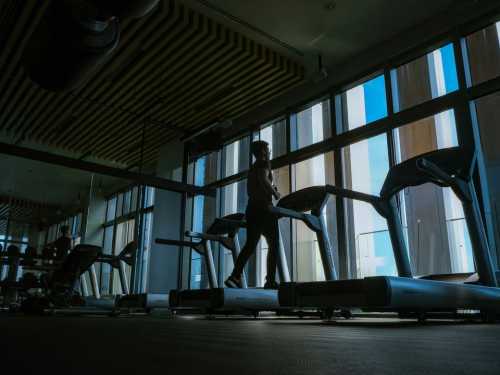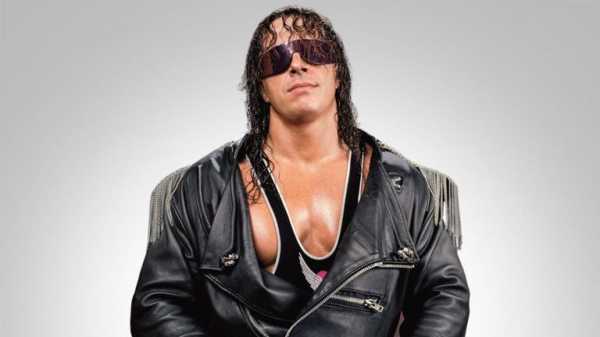
At the height of his fame, Bret ‘the Hitman’ Hart was the five-time world champion and star of the WWE that helped lead the company out of the austere mid-1990s and into its most lucrative era.
He was at the centre of the ratings war between the WWE and its arch-rival WCW, and eventually lured to the latter on record money for a pro-wrestler under acrimonious circumstances that would change the perception of the industry forever.
In the succeeding years, he was known as the guy the WWE “screwed over”, and the bereaved brother of fellow wrestling star Owen Hart, who died in a tragic ring accident in 1999. Bret would be forced into retirement himself just a year later from a serious concussion that would eventually contribute towards a stroke.
But after 18 years away from the ring, after making peace with the WWE with Hall of Fame status, after battling cancer and releasing a best-selling book, does anybody still remember the ‘Excellence of Execution’ – the self-proclaimed ‘best there is, best there was, and best there ever will be’? Does anybody still care about who he was, what he stood for, or who he is today?
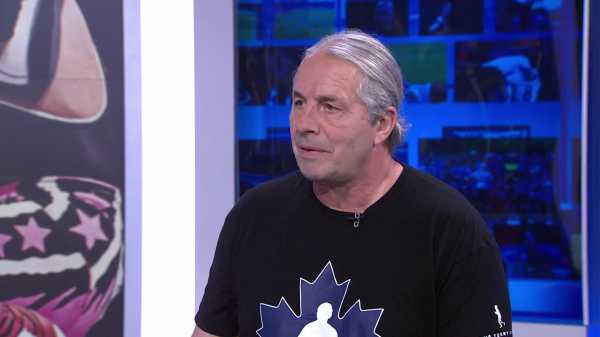
7:35 WATCH: Bret 'The Hitman' Hart visited the Sky Sports News Studio in June.
Professional journalists are trained not to make their work about themselves – to avoid use of the words ‘I’ and ‘me’ in any interview or feature – but it seems impossible to answer these questions without shining them through the prism of the Bret Hart fan in conversation with his boyhood hero.
When the WWE brought Summerslam to Wembley Stadium in 1992, my family did not have Sky television. A family friend used to send us occasional VHS tapes of a few WWE round-up shows and the odd pay-per-view, and after I first watched Bret Hart lose the Intercontinental title to the British Bulldog on August 29 that year, I was hooked on the Hitman.
‘Why’ is something I could never have answered sufficiently at the time but, thanks to the digital age and the WWE Network, wrestling nostalgia has had a resurgence. And thanks to my job, I was able to reconnect with Bret Hart as an adult for real – face-to-face – and properly analyse with him what it was.
“I think I had a really hard-working and authentic wrestling style, so people liked the way I was – that I was a ‘no-quit’ kind of wrestler, and I was very realistic and credible in my style,” he said on a visit to Sky Sports during a recent public speaking tour that packed out venues across the UK.
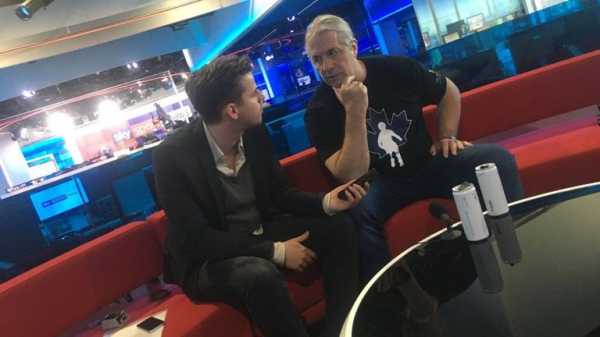
“I don’t know about England so much, but in Germany and some of these other countries, the pink was something that they liked. For those kids, the pink and black and the whole look with the sunglasses and the leather jacket was the right kind of hero they could get behind, and I think that really set me apart from everyone else.
“For some reason in the UK, Germany, Austria, Switzerland, Italy, and all the other markets that we had in those days, I had a completely different reaction from the fans in North America. I was well received in Canada and the United States but it was so much bigger over here.
“In fact it is hard to describe to people just how big it was – a bit like Beatlemania sometimes. In England I would get stampeded in the lobbies. They would run over to Ultimate Warrior and Macho Man and all those other guys, but they would run over to me too. It was always a bit of surprise – like ‘why is everyone so into Bret Hart?’ – including to me at the time.
“I remember in Italy, in Milan, there were all these young girls outside the bus crying, and I remember Jimmy Hart walking up the aisle and saying ‘I haven’t ever seen anything like this’. He said ‘they ought to go out and film that and show how big an impact you have’. No one did, but I remembered it and it was before my big break as champion. It was all bubbling under the surface.
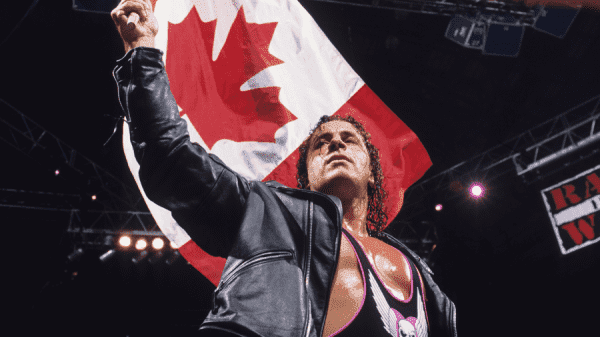
0:55 LISTEN to the exclusive Bret Hart interview on an a June episode of Sky Sports WWE podcast 'the Lock Up'
“I’m not saying it is, but it might also be that sometimes Americans can come off as so much better than everyone else. Being a Canadian may have set me apart from some of the American heroes that were coming through at the time, like Macho Man or Ultimate Warrior. I always had a much softer approach to my interviews and promos. I was not so much that wrestler that was yelling at the screen, I was always the one that was talking to my fans.
“I think I was different and maybe the first wrestler to come along in a long time that it wasn’t about how big I was or how big my arms were. I didn’t have 24-inch pythons or face paint and things like that. I just had my wrestling skills, and it was just about my wrestling skills and the stories I could tell in my matches.”
There was undoubtedly an authenticity about Bret Hart that lit up the ring and the TV screen. He was the good guy – but suffered no fools. He was technically the best – but never seemed arrogant. He stood for hard work and how determination will get you to the top and earn respect – and he looked cool doing it, with the leather jacket and heavy metal music.
To any young kid watching, especially young males, there was no better role model. But in meeting the Hitman at 60, some 26 years later, that authenticity would melt to superficiality if the man behind the wrestler was not the same.
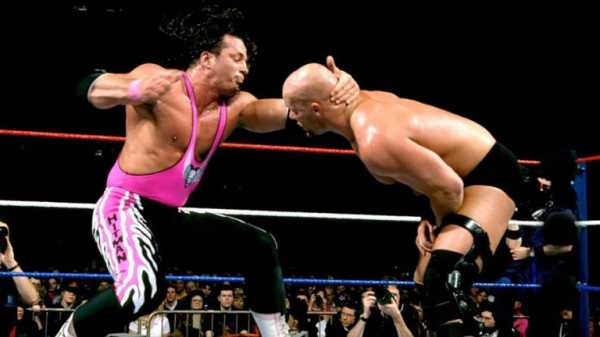
In meeting Bret I found a genuine guy who cared deeply about every aspect of his career and the message he projected to his fans. When the WWE was sexing-up into its infamous ‘Attitude’ era in 1997, Bret was coerced into a heel turn, this time into an anti-American Canadian patriot, and he talked about it with more than a hint of regret.
“I think it’s hard to differentiate between your wrestling character and your real character – you kind of end up being both,” he said. “I’ve always been my wrestling character in and out of the ring and in and out of the dressing room, and I was always really respected in the dressing room by the other wrestlers
“I very much worried about losing my fan base when they wanted to turn me heel. I remember that (WWE owner) Vince McMahon laughed and joked on the phone when he called me to tell me, and I said ‘I don’t want to turn heel, I don’t want to be a bad guy’.
“I really took pride in being a worldwide hero, much the same as John Cena today. But much the same as John Cena today, the wrestling audience was wanting something different. They wanted somebody new. So it was like, ‘do I change styles to stay alive’?
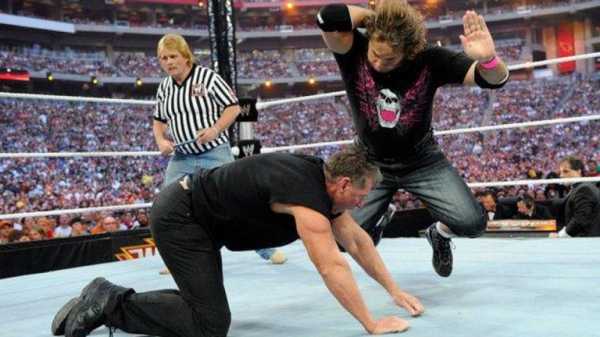
“Vince said ‘give me five minutes and I’ll talk you into it’, and I said ‘no thank you, I’m not interested’, but he talked me into it pretty fast because my option as a good guy was that I was going to wrestle Vader for the next year. That was going to be brutal, and I was thinking ‘anything but Vader’.
“So the heel turn was a difficult choice to make, and I remember Vince stressed to me – and I wonder whether that was the beginning of them trying to tear me down – that ‘you are going to be a hero everywhere else except the United States’.
“I don’t know if they were totally honest. I remember when we wrestled that pay-per-view in ’97 in Birmingham that they were clearly trying to turn me heal or trying to turn the audience against me on the mic and commentary, and that was Vince and Jim Ross and guys like that.”
If there is any proof that this did not work in the UK, it is the brimming halls that turned out to see him on ‘An Evening with Bret Hart’ tour, courtesy of Kayfabe Events, this summer. The interest that remains after more than 20 years is testament to his legacy that this feature has hopefully explained.
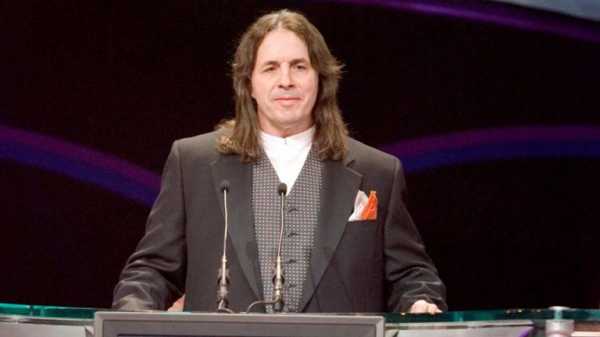
On the last night of the tour in Shepherd’s Bush, Bret answered the last fan’s question for more than 50 minutes, taking the audience on an emotional and intimate tour of his deepest thoughts. And he would have continued all night had nobody stopped him.
“I take being a hero really seriously,” he continued in our talk at Sky. “I know there are a lot of kids that watched me that are all grown up now, and they’ve watched me evolve in my life, from fighting cancer to fighting a stroke, even the screw job and my brother Owen passing. There are all these things I’ve had to go through in the public eye, and I think people respect me for how I carried myself.
“Growing up in wrestling – and I have been involved in wrestling really my entire life – I learned right from the get-go that you never forget your fans. They are the ones that put your food on the table and pay your bills.
“My dad was always genuine with the fans and said ‘you must appreciate every single one of them’, and I always did. I always tried to make time for every autograph or every picture. What’s an autograph? It’s the simplest thing in the world.
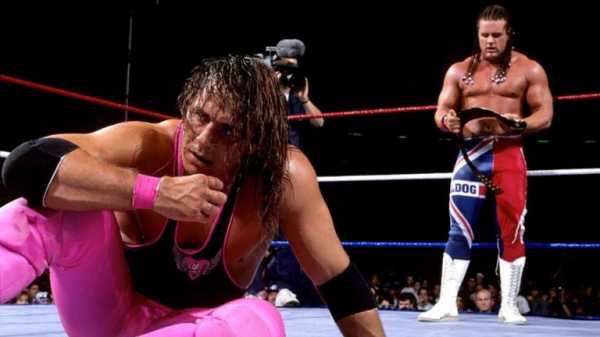
“When I come back, I see faces in people I met 15, 20 years ago. I know a lot of wrestling superstars sometimes forget where they came from. These people worship you for being a hero, and you give them the hand and tell them you’re too busy? You’ve got to remember that and then someday, when you wonder why you’ve got no fan base, you can just look at how you treated them.
“I think it’s easy in any profession (to say no to fans) – I’ve seen baseball players and basketball players and athletes of the highest calibre be pretty lousy about signing an autograph or taking a picture, and they forget that once they were a little kid asking somebody for the same thing. I just take those little things with me.
“I think I am a lesson in myself – to just believe in yourself and be true to yourself, and good things will happen. If you’ve got the confidence and the work ethic, you can make any dream come true.
“I applied a lot of that to myself. I think I was clearly a dark horse in wrestling. When I joined the WWE, I don’t think anybody thought I was going to rise out of that and become the star of the company.”
Also See:
Sourse: skysports.com


